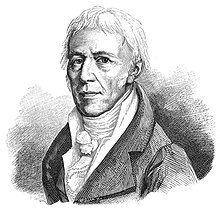Jean-Baptiste Lamarck
French naturalist (1744-1829)
Jean-Baptiste Pierre Antoine de Monet, Chevalier de Lamarck (1 August 1744 – 18 December 1829), often known simply as Lamarck, was a French naturalist. He was a soldier, biologist, academic, and an early proponent of the idea that evolution occurred and proceeded in accordance with natural laws. He gave the term biology a broader meaning by coining the term for special sciences, chemistry, meteorology, geology, and botany-zoology.


| This scientist article is a stub. You can help out with Wikiquote by expanding it! |
Quotes
edit- Ce que la nature fait avec beaucoup de temps, nous le faisons tous les jours, en changeant nous-mêmes subitement, par rapport à un végétal vivant, les circonstances dans lesquelles lui et tous les individus de son espèce se rencontroient.
- What nature does in the course of long periods we do every day when we suddenly change the environment in which some species of living plant is situated.
- Philosophie Zoologique, Vol. I (1809), p. 226; translation by Hugh Elliot, Zoological Philosophy: An Exposition with Regard to the Natural History of Animals (1914), p. 109.
- What nature does in the course of long periods we do every day when we suddenly change the environment in which some species of living plant is situated.
- On sait que cet animal, le plus grand des mammifères, habite l'intérieur de l'Afrique, et qu'il vit dans des lieux où la terre, presque toujours aride et sans herbage, l'oblige de brouter le feuillage des arbres, et de s'efforcer continuellement d'y atteindre. Il est résulté de cette habitude soutenue depuis longtemps, dans tous les individus de sa race, que ses jambes de devant sont devenues plus longues que celles de derrière, et que son col s'est tellement allongé, que la girafe, sans se dresser sur ses jambes de derrière, élève sa tête et atteint à six mètres de hauteur
- We know that this animal [the giraffe], the tallest of mammals, dwells in the interior of Africa, in places where the soil, almost always arid and without herbage, obliges it to browse on trees and to strain itself continuously to reach them. This habit sustained for long, has had the result in all members of its race that the forelegs have grown longer than the hind legs and that its neck has become so stretched, that the giraffe, without standing on its hind legs, lifts its head to a height of six meters.
- Philosophie Zoologique, Vol. I (1809), pp. 256–257; translation taken from The Classics of Science: A Study of Twelve Enduring Scientific Works (1984) by Derek Gjertsen, p. 316.
- We know that this animal [the giraffe], the tallest of mammals, dwells in the interior of Africa, in places where the soil, almost always arid and without herbage, obliges it to browse on trees and to strain itself continuously to reach them. This habit sustained for long, has had the result in all members of its race that the forelegs have grown longer than the hind legs and that its neck has become so stretched, that the giraffe, without standing on its hind legs, lifts its head to a height of six meters.
- Life, in a body whose order and state of affairs can make it manifest, is assuredly, as I have said, a real power that gives rise to numerous phenomena. This power has, however, neither goal nor intention. It can do only what it does; it is only a set of acting causes, not a particular being. I was the first to establish this truth at a time when life was still thought to be a principle, an archeia, a being of some sort.
- Système Analytique des Connaissances Positives de l'Homme (1820), as quoted in Lamarck, the Mythical Precursor: A Study of the Relations Between Science and Ideology (1982) by Madeleine Barthélemy Madaule, p. 102.